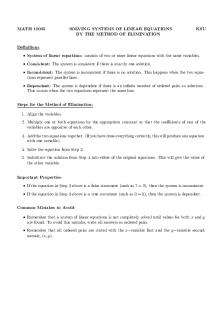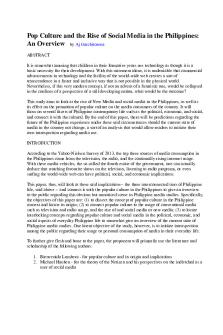A.J Ayer\'s The Elimination Of Metaphysics PDF

| Title | A.J Ayer\'s The Elimination Of Metaphysics |
|---|---|
| Author | Urna Chakrabarty |
| Course | Analytic Philosophy |
| Institution | University of Delhi |
| Pages | 2 |
| File Size | 74.6 KB |
| File Type | |
| Total Downloads | 591 |
| Total Views | 653 |
Summary
The Elimination of Metaphysics --A. Ayer In Language, Truth, and Logic (1936), A. Ayer wanted to establish the purpose and method of philosophical inquiry. Fundamental to this project was proving that the “traditional disputes of philosophers” are “for the most part as unwarranted as they are unfrui...
Description
The Elimination of Metaphysics --A.J. Ayer In Language, Truth, and Logic (1936), A.J. Ayer wanted to establish the purpose and method of philosophical inquiry. Fundamental to this project was proving that the “traditional disputes of philosophers” are “for the most part as unwarranted as they are unfruitful”. This book was influenced by the logical positivism of the Vienna Circle and Wittgenstein, which sought to evaluate truth only in terms of empirical verifiability or the logic of language. Ayer puts forth a modified version of this logical positivism, which he labels ‘ logical empiricism’. In the first chapter, The Elimination of Metaphysics, Ayer asserts that traditional metaphysics is nonsense, and therefore merits demolition. Metaphysics is the thesis that philosophy can give us knowledge of a reality transcending the world of science and common sense. Ayer’s takedown of metaphysics begins with him enquiring from what premises the metaphysician deduces their propositions about transcendent reality. They can’t use empirical evidence gained from the senses to arrive at such super-empirical conclusions. They might say that they use intellectual intuition, and while this argument can be dismissed as logically unjustified, it doesn’t mean that their conclusions are false. Thus, we need to overthrow transcendent metaphysics by criticizing the actual statements comprising it. Ayer maintains that no statement referring to a reality transcending the limits of all possible sense experience can have any literal significance, i.e. it is meaningless. Kant’s condemnation of transcendent metaphysics was on psychological, factual grounds: he set a limit to human experience and human understanding, by arguing that the human understanding lost itself in contradictions when it ventured beyond the limits of possible experience. But if is only possible to know what lies within sense-experience, one can’t assert that there even are things that lie outside of it. This is captured in Wittgenstein’s statement “in order to draw a limit to thinking, we should have to think both sides of this limit”. Citing Bradley’s idea that proving the impossibility of metaphysics is itself a metaphysical project, Ayer distances himself from Kant’s doctrine. To avoid just doing more metaphysics, Ayer must show that metaphysical claims are meaningless. He therefore sets out to prove that metaphysical propositions fail to conform to the linguistic conditions under which alone a sentence can be literally significant. Ayer says that we must rely on the criterion of verifiability to decide which sentences are genuine propositions about matters of fact. This verifiability principle says that a sentence is factually significant to any given person iff they know how to verify the proposition thereby expressed, i.e. if they know what observations would lead them, under certain conditions, to determine its truth or falsehood. If however this proposition is such that the assumption of its truth or falsehood is consistent with any assumption whatsoever concerning the nature of one’s future experience, then it is either a tautology or a pseudo-proposition. Similarly, if there are no observations that could lead us to answer a particular question, it isn’t genuine. Ayer differentiates between practical verifiability and verifiability in principle . Practical verifiability refers to actually making the observation that would verify or falsify a proposition. One could not, in person, have verified the proposition that there are mountains on the other side of the moon, or diamonds buried under the mantle of Mars. However, one knows that this proposition is decidable by observation. Therefore this proposition is verifiable in principle and is accordingly significant. On the other hand, with metaphysical statements like Bradley’s "the Absolute enters into, but is itself incapable of, evolution and progress", it is impossible to conceive of an observation which would determine its truth or falsity. Unless the author can furnish such possible observations that would clinch the matter, the sentence remains nonsensical. If the author admits that the sentence wasn’t meant to express either a tautology or a verifiable-in-principle proposition, Ayer dismisses the sentence as having no literal significance for the author, even. The second distinction is between the weak and strong senses of verification. A proposition is verifiable in the strong sense iff its truth could be conclusively established by experience. It is verified in the weak sense if it is possible for experience to render it probable. Ayer doesn’t want to adopt strong verifiability as our criterion of significance, as that would prove to be too much. It would exclude all general propositions of law, such as “arsenic is poisonous” “all men are mortal”, etc., because the truth of such propositions can’t be established with certainty by any finite number of observations. These general laws are meant to cover an infinite number of cases, and so cannot even in principle be verified conclusively. If we adopted strong verifiability, we would have to classify such propositions as nonsense. Ayer rejects the proposal that we treat these propositions as “important pieces of nonsense”, calling it an attempt to hedge in the face of a paradox. The truth of propositions about the remote past can also never be more than highly probable, if we adopt strong verifiability. Only a “tautology,” a claim which has no factual content and conveys no information about the world, can be anything more than a probable hypothesis, e.g. Either today is Tuesday or it isn’t. Ayer also
The Elimination of Metaphysics --A.J. Ayer rejects the Popperian proposal that a sentence is factually significant iff it expresses something which is definitely confutable/falsifiable by experience, because a hypothesis cannot be conclusively confuted any more than it can be conclusively verified (as falsification entails the presumption of certain conditions existing, and it isn’t logically impossible that this assumption may be false in some cases). Therefore, Ayer accepts the weaker sense of verification. When judging the genuineness of a proposition, we ask whether any observations would lead us to determining its truth or falsehood. This criterion doesn’t exclude general or historical propositions from meaningfulness, unlike conclusive verifiability. In other words, a genuine factual proposition doesn’t have to be equivalent to an experiential proposition (records an actual/possible observation), but some experiential propositions should be deducible from it, in conjunction with other premises, without being deducible from the latter premises alone. There are certain assertions that weak verifiability rules out:
Metaphysical Questions about ‘Substance’—the monists believe that reality is one substance, while the pluralists maintain that there are many ultimate substances. But no possible observation could give any probability to either assertion, and so neither assertion is significant. This metaphysical question is spurious. Realism vs Idealism—Ayer uses the analogy of two groups of people disagreeing over whether a certain painting is by Goya or not. They are united when it comes to what evidence would settle the matter. In this context, it would be ridiculous if one of the groups said the painting was located in the mind and the other said it was located in the physical world. Both groups accessed the painting through their senses. There is no similar process by which they could decide whether the picture is real or ideal. Thus, this is a fictitious problem.
Ayer reiterates his aim: to make philosophy distinct from metaphysics. Metaphysical sentences are nonsensical; only tautologies and empirical hypotheses are significant propositions. Ayer argues that the metaphysician falls prey to the superstition that every name corresponds to a single real entity, because they are misled by a superficial grammatical feature of language. The proposition ‘Unicorns are fictitious’ is structurally similar to ‘Dogs are faithful’, leading us to believe that they are of the same logical type. However, dogs must exist in order to be faithful, and so it is held that unicorns must also in some way exist in order to have the property of being fictitious. Ayer traces metaphysicans’ desire to raise questions about Being to how sentences which express existential propositions and sentences which express attributive propositions may have the same grammatical form, in language. For example, the sentences ‘Martyrs exist’ and ‘Martyrs suffer’ both consist of a noun followed by an intransitive verb. This grammatical similarity leads people to make the mistake of assuming that they are of the same logical type. As Kant pointed out, existence is not an attribute. The very ascription of an attribute to a thing implies that we have asserted its existence. If existence were an attribute itself, all positive existential propositions would be tautologies, and all negative ones self-contradictory; which is not the case. Thus, these metaphysical questions about Being follow grammar beyond the boundaries of sense. Some see metaphysics as a type of poetry. Its statements may not have literal meaning, but they still express emotion and may inspire people morally. Ayer decries this assumption. Poets rarely produce sentences with no literal meaning, and even when they do their sentences are carefully chosen for some aesthetic purpose—like rhythm or balance. Ayer clarifies that the metaphysician unintentionally writes nonsense, through a failure to understand the workings of our language. And the distinction between metaphysics produced by a philosopher who has been duped by grammar and that produced by a mystic trying to express the inexpressible isn’t important, according to Ayer. Both classes of metaphysicians can be dismissed as producing nonsense....
Similar Free PDFs

Determinatiesleutel Grassen AJ 1718
- 15 Pages

Elimination
- 10 Pages

Aristotle's Metaphysics
- 30 Pages

CS8592-AJ - AEC
- 88 Pages

Metaphysics Lecture notes
- 54 Pages

Bowel Elimination
- 9 Pages
Popular Institutions
- Tinajero National High School - Annex
- Politeknik Caltex Riau
- Yokohama City University
- SGT University
- University of Al-Qadisiyah
- Divine Word College of Vigan
- Techniek College Rotterdam
- Universidade de Santiago
- Universiti Teknologi MARA Cawangan Johor Kampus Pasir Gudang
- Poltekkes Kemenkes Yogyakarta
- Baguio City National High School
- Colegio san marcos
- preparatoria uno
- Centro de Bachillerato Tecnológico Industrial y de Servicios No. 107
- Dalian Maritime University
- Quang Trung Secondary School
- Colegio Tecnológico en Informática
- Corporación Regional de Educación Superior
- Grupo CEDVA
- Dar Al Uloom University
- Centro de Estudios Preuniversitarios de la Universidad Nacional de Ingeniería
- 上智大学
- Aakash International School, Nuna Majara
- San Felipe Neri Catholic School
- Kang Chiao International School - New Taipei City
- Misamis Occidental National High School
- Institución Educativa Escuela Normal Juan Ladrilleros
- Kolehiyo ng Pantukan
- Batanes State College
- Instituto Continental
- Sekolah Menengah Kejuruan Kesehatan Kaltara (Tarakan)
- Colegio de La Inmaculada Concepcion - Cebu









